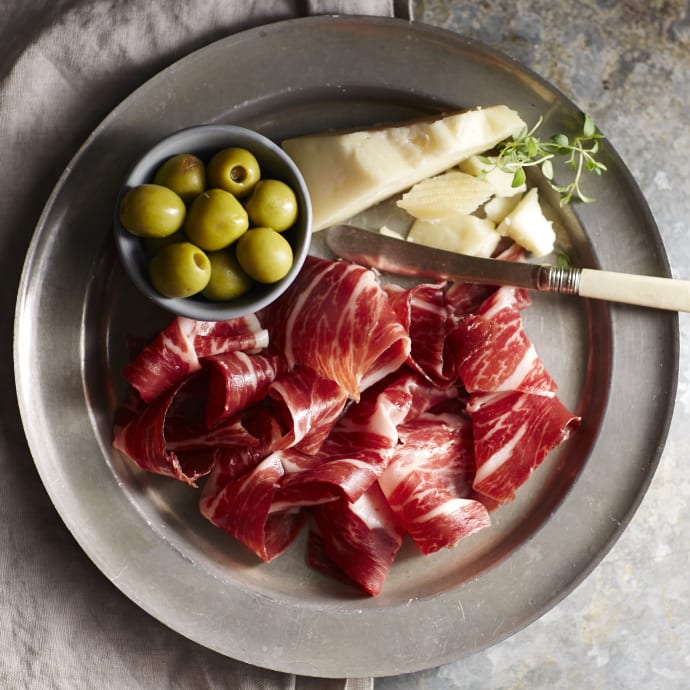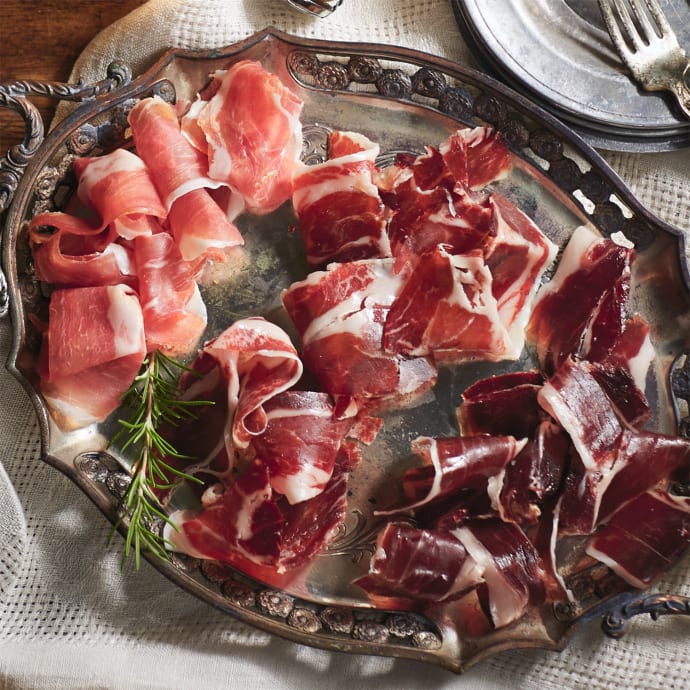
Despite U.S. Clamor, These Piggies Stay in Spain
The Wall Street Journal
-
July 20, 2004
Katy McLaughlin
Rob Tarpin dreams of the day he can sit down to dinner at his home in Naples, Fla., and sink his teeth into a slice of Spanish ham.
Not just any ham, but jamón ibérico, Spain's legendary, fatty, cured pork. He has even bought a traditional Spanish wooden ham holder to cradle the ham he hopes to buy. "We love that ham," he says.
The only problem: Jamón ibérico is illegal in the U.S. So Mr. Tarpin -- along with 120 or so other fans of the Spanish delicacy -- has put down a $199 deposit with a Spanish-food Web retailer that entitles him to buy a jamón ibérico if and when it ever becomes legal here. Don Harris, one of the owners of the site, latienda.com, calls the deposits "ham futures."
It's against the law to import jamón ibérico because Spain doesn't have a single slaughterhouse certified by the U.S. Department of Agriculture. Still, the ham ranks as a national treasure in its home country, on a par with Italy's truffles and Russia's caviar. Rows of ibericos -- swaddled in yellow fat, crusted with a thin film of protective mold and sporting occasional strands of wiry black pig hair -- dangle from restaurant ceilings nationwide, with hoofs still attached.
Aged in cellars for up to three years, the deep red flesh of jamón ibérico has a nutty flavor because the pigs gorge themselves on acorns.
Restrictions on imports have turned otherwise law-abiding Americans into international ham smugglers. Andres Aguirre, a software engineer in Belmont, Mass., says he got a few slices past the dogs at John F. Kennedy airport customs after a visit to Spain a few years ago. The hounds were distracted by a larger ham stash in another passenger's bag, he says. Mr. Aguirre has purchased futures in two hams.
People who carry jamón into the U.S. face federal prosecution under the Animal Protection Act -- which aims to keep diseases away from American livestock -- and possible 10-year jail sentences and/or $50,000 fines. But the USDA says it is unaware that anyone has been prosecuted for jamón offenses. While Spain is disease-free, it is classified by the U.S. as posing some risk for classical swine fever and foot-and-mouth disease.
Nicholas Gutierrez of Smithtown, N.Y., got a taste of jamón last year at a local Spanish restaurant whose chef, a friend of his, served him an illicit slice. Mr. Gutierrez says he invested in a ham future two days later. "My family says I'm out of my mind," he says.
His hope of getting his hands on a legal ham rests on the shoulders of the Harris family, owners of latienda.com, in Williamsburg, Va. Don Harris, who fell in love with Spanish cuisine in the 1960s when he was stationed in Spain as a Navy chaplain, launched the company with his wife and three sons in the mid-1990s. It has bothered them for years that while they have been successful selling everything from paella rice to saffron, they cannot offer what they consider the Holy Grail of Spanish food.
The trick is to prove to Spain's skeptical jamón makers that an eager U.S. market awaits them if they will just bend their age-old practices to conform with U.S. regulations.
So, two years ago, the Harrises decided to pre-sell the ham on their Web site. For the $199 deposit, customers get the right to buy an iberico as soon as U.S. regulatory hurdles are overcome. Since Spain's output is so small -- about four million hams a year -- futures holders are basically paying for guaranteed delivery in the event that U.S. demand outstrips supply.
The deposits are held in escrow and are refundable in the event people run out of patience or get scared off by the ever-rising price estimate. The ham was originally supposed to cost $59 a pound for the 15 pound hams, but as the dollar has declined against the euro, that has risen to about $70 a pound -- more than $1,000 for the whole ham. In Spain, a top quality iberico currently sells for about $550.
With their list of 120 investors, the Harrises -- Don, Tim and Jonathan -- headed for Spain to look for producers willing to build a USDA-approved slaughterhouse, or to ship their special pigs to an approved facility elsewhere in Europe for slaughter. The only Spanish meat products exported to the U.S. now are made from animals slaughtered at USDA-certified plants outside Spain. That includes jamon serrano, a less prestigious ham that is similar to Italian prosciutto.
That's when the USDA's zeal for regulation collided with the Spanish passion for tradition. Jamon iberico is produced in just one region of Spain, mostly by small producers who adhere strictly to time-tested methods. They use only one breed of swine, a black-hoofed Iberian pig indigenous to southwest Spain's Mediterranean forest ecosystem -- where today they still range freely, fattening themselves up on grass, roots and mushrooms.
And acorns. The most desirable hams -- about 15 percent of production -- come from the pigs that eat as much as 2,000 pounds of acorns in the two or three months before their slaughter. After butchering, the hams are rubbed with salt and then hung to cure for one to three years.
Starting in 2002, Harris son Tim sat down with some of the most renowned producers, including Sanchez Romero Carvajal and Carnicas Joselito. His business proposal was straightforward: Transport the 350- to 400-pound pigs to Denmark, where they could be slaughtered in a USDA approved facility.
But the companies scoffed at the suggestion. "They said the hogs would get stressed-out and thirsty, and that would be bad for the ham," Tim Harris says.
Both Spanish companies say a long truck ride would cause the pigs' adrenaline levels to surge, which could affect the flavor of the meat. The companies also voiced a humanitarian objection. "When you transport them in a truck, they're scared and they suffer," says Rosalia Castellano, a saleswoman for Sanchez Romero Carvajal.
In more meetings, producers explained that exporting to the U.S. doesn't make economic sense for them. That's because it's impossible for many companies to increase production since they can only raise as many Iberian pigs as they have Mediterranean forest and acorns to sustain them. They already sell out their entire production to the Spanish market alone -- often years in advance.
It didn't help that many Spanish producers find the U.S. regulations unfair to begin with. "We've been eating jamón ibérico in Spain for over 2,000 years and no one has ever died from eating it," says Miguel Ullibarri of Real Iberico, a trade group that promotes jamon iberico.
After months of fruitless meetings, late last year the Harrises switched tactics and targeted larger companies including Campofrio, Spain's biggest meat processor. There, they got some good news: Campofrio had just built a slaughterhouse in Spain to U.S. specifications so it had a good shot at meeting USDA standards.
Don Harris fired off an exuberant e-mail to ham futures holders. "We have great news from Spain!" The first hams should ship by mid-2005, he predicted.
But earlier this year, that dream was dashed. Campofrio sold its fresh-meat division to another company, putting the iberico project on ice.
Since then, four of the ham futures holders have bailed out. But most are hanging on. Since February, the Harrises have been working on a deal with Covap, a Spanish agricultural cooperative in Cordoba that has a new slaughterhouse. It plans to apply for USDA certification in the next year or so.
So if all goes well, Mr. Tarpin, the Florida futures holder, will have a ham in his cradle by early 2007. He's already planning the party.
Other Press
Holiday Gift Guide 2024: The Finest Spanish Olive Oils For A Taste Of Spain
Forbes
-
November 26, 2024
A trio of savory snacks to enjoy this fall
Atlanta Journal-Counstitution
-
November 1, 2024
The 15 Best Gifts for People Who Love Food
Wirecutter
-
October 23, 2024
The 48 Best Gifts for Dads
Wirecutter
-
October 16, 2024
Featured Products
 SHIPS FREE
SHIPS FREECinco Jotas Bone-In 100% Ibérico de Bellota Jamón - FREE SHIPPING!
JM-106
$1,499.00$1,499.00
 SHIPS FREE
SHIPS FREEBone-In Jamón Ibérico Ham by Fermín - FREE SHIPPING!
JM-11
(9)
$750.00$750.00
 SALE
SALESliced Ibérico Ham by Peregrino, Nitrate Free - 2 oz
JM-23
(35)
$25.00 $22.00
 BEST SELLER
BEST SELLERJamón Tasting Trio of Sliced Ham
JM-25
(32)
$79.00$79.00
 BEST SELLER
BEST SELLERCured Meats of Spain Sampler
JM-45
(36)
$99.00$99.00
 BEST SELLER
BEST SELLERSliced Ibérico de Bellota Ham by Peregrino, Nitrate Free - 2 oz
JM-52
(45)
$39.00$39.00






